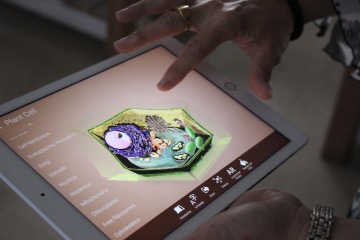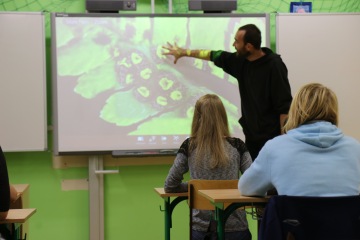Charles University has studied the impact of using Corinth on achievement in chemistry and science education. Using data from 565 pupils, the study showed that the use of 3D models has a significant effect on students' intrinsic motivation.

Corinth has been proven to increase pupils' intrinsic motivation
The study focused on examining intrinsic motivation. It examined this through four key aspects - pupils' interest in the subject matter, pupils' willingness to put effort into the learning process, pupils' perception of their own abilities and pupils' understanding of the usefulness of the subject matter. And what were the results?
Interest in the subject matter
The use of Corinth significantly increased pupils' interest in the subject matter. Pupils rated the lessons as more interesting, attractive and enjoyable.
Putting effort into learning
Teachers noted that pupils were more willing to put effort into the teaching process. Their effort to succeed and understand the material was evident.
Perceived competence
Pupils were more confident in relation to the subject matter. They felt they were doing well and mastering the material better.
Perception of the usefulness of the taught subject matter
Compared to the control group, pupils who used the Corinth app rated the material discussed as more useful and perceived it to be of greater benefit in relation to their education.
The study showed that the effect of engaging with the Corinth app on pupils' intrinsic motivation persisted two months after the start of the experiment. This was the case for three of the four intrinsic motivation scales studied. The long-term impact was more pronounced for chemistry, where the material discussed is generally more difficult to represent and abstract. And it is in these cases that visualisation and the ability to look at phenomena and details that are otherwise impossible to see proved very beneficial.
In addition to measuring pupils' progress and change, the research has also focused on teachers' perspectives. Interviews with them revealed that:
- they rate the Corinth app as a very useful tool that improves pupils' imagination, is useful for facilitating their understanding of the material discussed and helps them to better present the material discussed
- they perceive that the app has a very positive effect on pupils - they find the models interesting, attractive, fun
- pupils appeared more motivated, more active and more engaged in the lessons
There was also a positive effect on academic performance, most significantly for abstract and complex topics
The study showed that using 3D models and animations from Corinth had a significant positive effect on achieving better results in knowledge tests in the subject of chemistry. There was also a slight improvement in the subject of science, but the comparison was not as pronounced and statistically significant. One possible explanation is the higher difficulty of the subject chemistry in terms of abstract thinking. It is the greater demands on the imagination that creates room for the use of visualisations and a more pronounced effect of the use of 3D models.

About the research
The study included 565 primary and secondary school students who were divided into a control and an experimental group.
Research questions:
- What effect does the Corinth application have on pupils' intrinsic motivation in relation to learning science subjects?
- How does the effect of Corinth change with its increased use in science teaching?
- What is the effect of using Corinth on the knowledge achieved in chemistry and science subject teaching?
Data were collected through pre- and post-questionnaires with 25 statements that fell into four scales: 1. interest / enjoyment, 2. putting effort into learning, 3. percieved competence, and 4. effort / importance.
Conclusion of the study
The study by Charles University confirmed the significant positive impact of incorporating 3D models into teaching on students' intrinsic motivation and learning outcomes. The teaching of science subjects, specifically biology and chemistry, was more attractive and more enjoyable for students thanks to Corinth. The noticeable change in engagement, willingness to put effort into the teaching process and perceived relevance of the material discussed was confirmed not only by statistical data collected from 565 primary and secondary school students, but also by teachers who used Corinth in their classes. The study showed that the impact on intrinsic motivation was long-lasting, even 2 months after the start of the experiment.
Corinth is particularly useful for more complex, difficult to introduce or abstract topics. This is indicated by the outcomes that compared learning outcomes and understanding of the material discussed. These showed that it is in topics such as chemistry that the impact of using the app is strongest.
Read the article published in International Journal of STEM Education for more details.
Do you also want to stimulate pupils' interest and motivation?
Learn more about the app and contact us.
